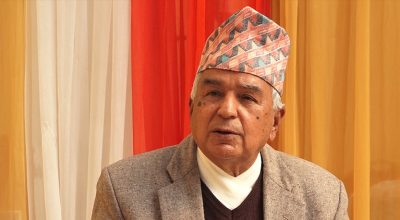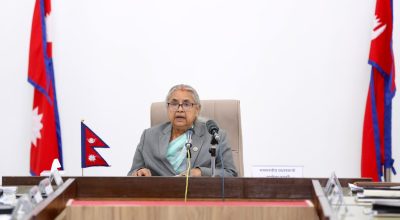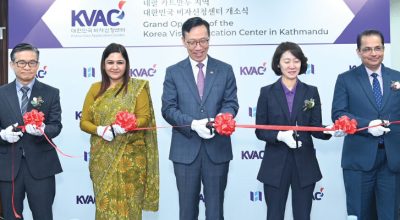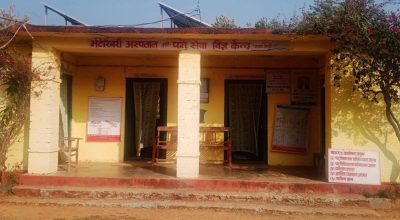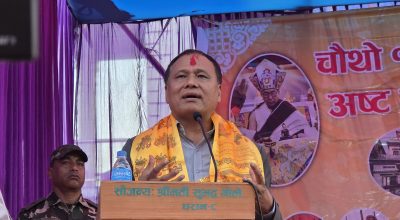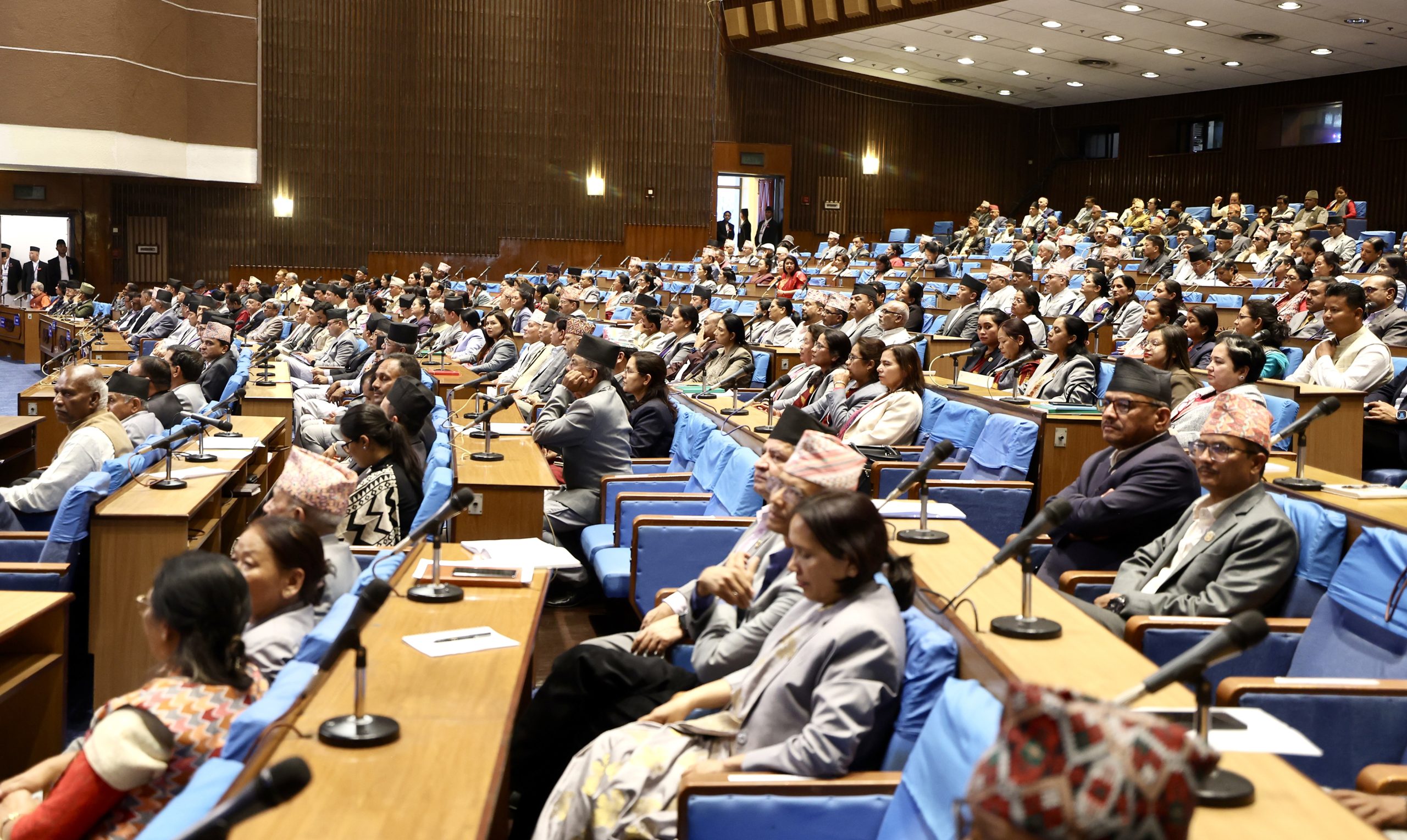
Kathmandu, May 14: The government has said that the laws, procedures and structures related to industry and investment will be updated in order to improve the overall environment of the industrial sector.
In the policies and program unveiled in the Federal Parliament on Tuesday, it has stated that morale of industrialist, entrepreneurs will be enhanced by creating a business-friendly environment in the country. It further said, “Private investment companies will be encouraged to operationalize and manage closed public enterprises and to implement large projects by integrating scattered small capital. The private sector will be attracted in the construction and operation of industrial zones, special economic zones and industrial villages. Encouragement will be made to use the
fourth-generation industrial concept in the industries.”
Programs related to production, consumption and employment growth in industry, agriculture and other sectors will be operationalized in an integrated manner. Programs that help encourage entrepreneurship and innovation will be brought into implementation. Vocational trainings in the government sector will be implemented so as to promote entrepreneurship development and self-employment.
Make in Nepal
“Make in Nepal” and “Made in Nepal” campaigns will be promoted.
Domestic and foreign investors will be attracted to the works of exploration, extraction and processing of mines and minerals. Existing legal arrangements will be reviewed to make necessary minerals easily available for development and construction works so as to properly utilize and protect forests, mines, and mineral resources.
A detailed project report of potential mines including magnesite, phosphorite and iron will be prepared, and environmental study will be initiated. Exploration of petroleum products in Dailekh will be completed in the next fiscal year.
A national campaign on innovation and startups will be operationalized. The National Startup Enterprise Policy will be implemented in collaboration with all the three tiers of government as well as the private sector. There will be collaboration with academic institutions to develop and promote start-up businesses. Startups will be developed and promoted by establishing business incubation centers in all seven provinces with the
participation of private sector. The scope of concessional loan will be extended to run startup businesses.
The entrepreneurship of youth, Dalits, women and marginalized communities who have returned from foreign employment will be developed; and micro, cottage and small scale industries will be promoted and upgraded at the local level. In the upcoming fiscal year, at least one thousand micro, cottage and small industries will be provided with concession on interest and technology. Arrangements will be made to enable micro, cottage and small entrepreneurs to operate their business by registering in one place. Enterprises that are indigenous and are based on traditional skills and professions will be promoted.
Diplomatic missions and Non-resident Nepali Community will be mobilized to enhance the international access of Nepali products by promoting traditional handicrafts including sculpture, thangka and woodcraft.
Institutional arrangements will be made to accredit organizations that certify goods, services, processes, management systems or individual competence. The capacity of the laboratory related to quality measurement will be expanded and strengthened. Intellectual property related legislations will be updated.
Regional coordination and cooperation will be strengthened to implement the Nepal Trade Integrated Strategy. Business Infrastructure Development Master Plan will be prepared and implemented. Nepali goods will be made competitive in the international market by developing and using business infrastructure and technology.
Construction of Dodhara-Chandani dry port will be expedited. Transit routes will be used in accordance with agreements with neighboring countries. Efforts will be made to utilize India’s inland waterways to reduce trade cost. Access from waterways to the sea and the infrastructure and facilities of the integrated check posts will be expanded. Cost and time of international trade will be reduced through multimodal transportation.
Bilateral trade and investment agreements will be concluded with the countries that have export potential for Nepali products. Country-specific and productspecific export strategies will be adopted based on the potential of Nepal’s international trade. Institutional capacity of business information and market research will be enhanced. Standards of geographical indication will be prepared for the crops and goods of a special nature that can be exported.
In order to make the supply management of petroleum products smooth and cost-effective, construction of petroleum pipelines as well as storage capacity will be enhanced. Emphasis will be placed on production and utilization of bioethanol and green hydrogen.
Branding of home-made liquor
Regular supply of food and salt will be ensured in remote and hilly districts. Agro Industrial Park in Gorkha, Mega Food Park in Far-Western Province and Food and Fruit Processing Centre in Karnali Province will be established. Special program for regulated production, branding and export of homemade liquor will be launched ensuring its quality. Easy market access will be ascertained for indigenous product by integrating it into the supply chain.
Arrangements will be made to purchase certain amount of domestic production of essential goods and sell them through public enterprises. With a view to be selfrelient in essential goods including medicines, industrial capacity will be enhanced and private sector will be encouraged.
Consumer Court will be established to guarantee the constitutional rights of consumers. Specialized market monitoring mechanism including the participation of multi-stakeholder agencies will be mobilized to make market monitoring more effective.
Emphasis will be placed on the production of goods with export potential. Additional goods and services with export potential will be identified; production and marketing enhanced and integrated into value and supply chains. Provinces and local levels will be encouraged with technology and technicians for exporting agricultural produce, dairy and meat products and industrial production by declaring export-oriented production zones.
Concession will be provided to the entrepreneurs exporting agricultural and livestock products with value addition. Special program targeting export potential countries will be implemented in order to export the agricultural and livestock products.
Tourism sector programmes will be restructured. Nepal will be developed as a primary and attractive tourist destination through development, marketing and easy access of tourism products. Identification, development and promotion of tourist destinations will be carried out by developing a national tourist destination profile.
Great Himalayan Trail
Hill-top tourist destination will be developed in coordination with the three tiers of government and the private sector in order to utilize local means and resources and create employment in the hilly terrain with tourism potential. Construction of tourist trail infrastructure including ‘Great Himalayan Trail’ will be expedited.
Film tourism will be promoted by attracting international filmmakers including from Hollywood and Bollywood for film shooting in Nepal. The mountaineering permit system will be automated. Tourism infrastructures including Tourist Rescue Center will be built and developed.
Timely amendment will be made on aviation policy and laws. Air service will be made safer, easily reachable and accessible. Domestic and international airports will be upgraded and operated in full capacity. Special incentive package will be arranged for the operation of Pokhara and Bhairahawa International Airports. International market of Nepali airline companies will be expanded.
National Cultural Policy will be implemented. Archives of national significance will be preserved with modern technology. Native, historical and cultural heritage will be preserved and developed. Initiatives will be taken to include important heritage sites in the World Heritage List. Institutional arrangements will be made for touristic development of cultural and religious sites.
Tourism will be promoted by determining the route to Buddha Circuit, Shiva Circuit, Ramayana Circuit and Kirat Cultural Circuit.
In Chundi Ramgha, the birthplace of Aadikavi Bhanu Bhakta, construction of Bhanu Literature Park with statues and Saptadham of eminent writers of different languages of Nepal will be expedited.
Pariwartanka Lagi Kala ra Sahitya Karyakram (Art and Literature Program for Change) will be conducted to promote historical films, songs, music, research and domestic films related to individuals and movements that have significantly contributed for social transformation.
Inter-level and inter-agency coordination will be ensured on national infrastructure development. Geographical and provincial balance will be maintained by avoiding duplication in infrastructure development. An integrated national transport master plan covering road, rail and
waterways will be prepared. Rural communities, productive agricultural zones and socio-economic zones will be connected through road networks.
The centres of local level which are not yet connected to the road network will be connected to the respective provincial capital or the nearest national highway.
Road infrastructure will be made qualitative and safe for the overall socio-economic development and trade facilitation. Road sections with strategic and commercial importance will be constructed and upgraded. Wildlife-friendly road structures will be constructed in national forests and conservation areas.
Construction and upgradation of East-West Highway, Mid-Hill Highway and Postal Highway will be expedited. To develop Mid-Hill Highway as a prosperity corridor, production, productivity, entrepreneurship and employment will be created by developing infrastructures including electricity,
communication, tourism, education, health and water supply. In most of the sections of Koshi, Kaligandaki and Karnali corridors, construction work will be expedited to make transport operational round the year.
Construction of strategically important tracks and infrastructure of Seti Highway and Mahakali Corridor will be carried forward with priority. Construction and upgradation of Tamor Corridor, Bheri Corridor, Saljhandi-Dhorpatan road, Martyr road and Kanti Highway will be continued. Galchhi-Rasuwagadhi road upgradation work will be expedited. Upgradation of Nagdhunga-Naubise-Mugling road section to dedicated two lanes and Mugling-Pokhara road section to four lanes will be continued.
Construction of modern infrastructure such as tunnels, fast tracks, flyovers, underpasses and overpasses will be prioritized in order to reduce transport costs and traffic congestion. Construction of KathmanduTerai/Madhesh fast track road will be completed within the year 2083. Nagadhunga tunnel and Gwarko overpass will be brought into operation within the next fiscal year. While expanding the Kathmandu Ring Road, underpasses and overpasses will be constructed on the road sections with heavy traffic.
Construction of bridges of modern and special nature will be continued on the major rivers on the national highway. Local road bridges under construction will be completed and handed over to the concerned agency. Suspension bridges will be constructed ensuring easy crossing-over within the range of an-hour-walk.
Maintenance and preservation of the road section and bridge at the national highways will be continued. Road network with adequate road-side furnitures will be developed and constructed keeping road safety and accident reduction as top priority.
Construction works of Bijulpura-Bardibas section of Jaynagar-Bardibas railway and Bathnaha-Biratnagar railway will be expedited. Construction works of Bardibas-Chocha section of East-West electric railway will be completed. Feasibility study of KerungKathmandu railway track will be expeditiously completed. The implementation process of RaxaulKathmandu railway will be carried forward by finalizing investment modality.
Public transport service will be made easily reachable, safe, and accessible by implementing digital system in transport management. Sustainable and environment friendly integrated transport system will be developed.
Institutional and procedural arrangements will be made for the use of water transport. Waterways with terminals will be constructed in Sunkoshi and Narayani rivers. Legal arrangements will be made for registration of ships in Nepal to be operated in the seas.
Urban infrastructure indicators will be prepared based on geo-information system. Policy arrangement will be made for construction of basic physical and social infrastructure with minimum open space in potential dense neighborhoods while integrating residences. Address locating system based on geo-information will be implemented all over the country.
Policy arrangements will be made including for enabling the private sector to operate land development programmes. Urban infrastructures will be constructed in joint investment by restructuring City Development Fund. Settlements of geographically remote, scattered and disaster-prone areas will be encouraged to relocate to safe place by developing integrated settlements.
Unmanaged and slum settlements, where the poor, helpless and marginalized communities reside, will be upgraded into well managed settlements. Development and expansion of well managed urbanization will be strengthened by arranging necessary infrastructure in the vicinity of Hulaki highway. Government and public buildings and residential buildings of the indigent communities will be reinforced.
Building code will be amended in tandem with local skills and technologies. Technical efficiency of the Province and Local level will be increased for the implementation of the Building Code. Urban lifestyle will be improved through disaster resistant sustainable urban development and management. Technology and human resources will be developed for reinforcing seismic-prone buildings.
Greater Master Plan of Kathmandu Valley will be implemented effectively. Construction of new city will be carried forward in the north-eastern region of Kathmandu in cooperation with the local level and the private sector. Three selected cities will be developed as model smart cities. Integrated urban infrastructure will be built in Lumbini, Pokhara and Janakpur under the concept of cluster city while prioritizing new cities
under construction.
Laws related to ownership of joint housing will be reformed. Construction permits, development and management of joint housing will be simplified and managed.
To ensure minimum flow in Bagmati river during the dry season, water replenishment centres will be constructed in the Kathmandu valley and vicinity. Environmental improvement of Bagmati River will be done by building necessary infrastructure and structures. It will be encouraged to apply the concept of reduction, recycling and reuse in waste processing and management. A high-powered mechanism will be arranged with the participation of stakeholders from the affected areas for the management of Bancharedanda landfill site.
National Energy Policy and Water and Meteorology Policy as well as laws related to water resources, energy efficiency and renewable energy, irrigation, river and water induced disaster management will be implemented for the overall development and use of water resources. In accordance with the River Basin Master Plan, water resources will be properly protected, enhanced and optimally utilized.






